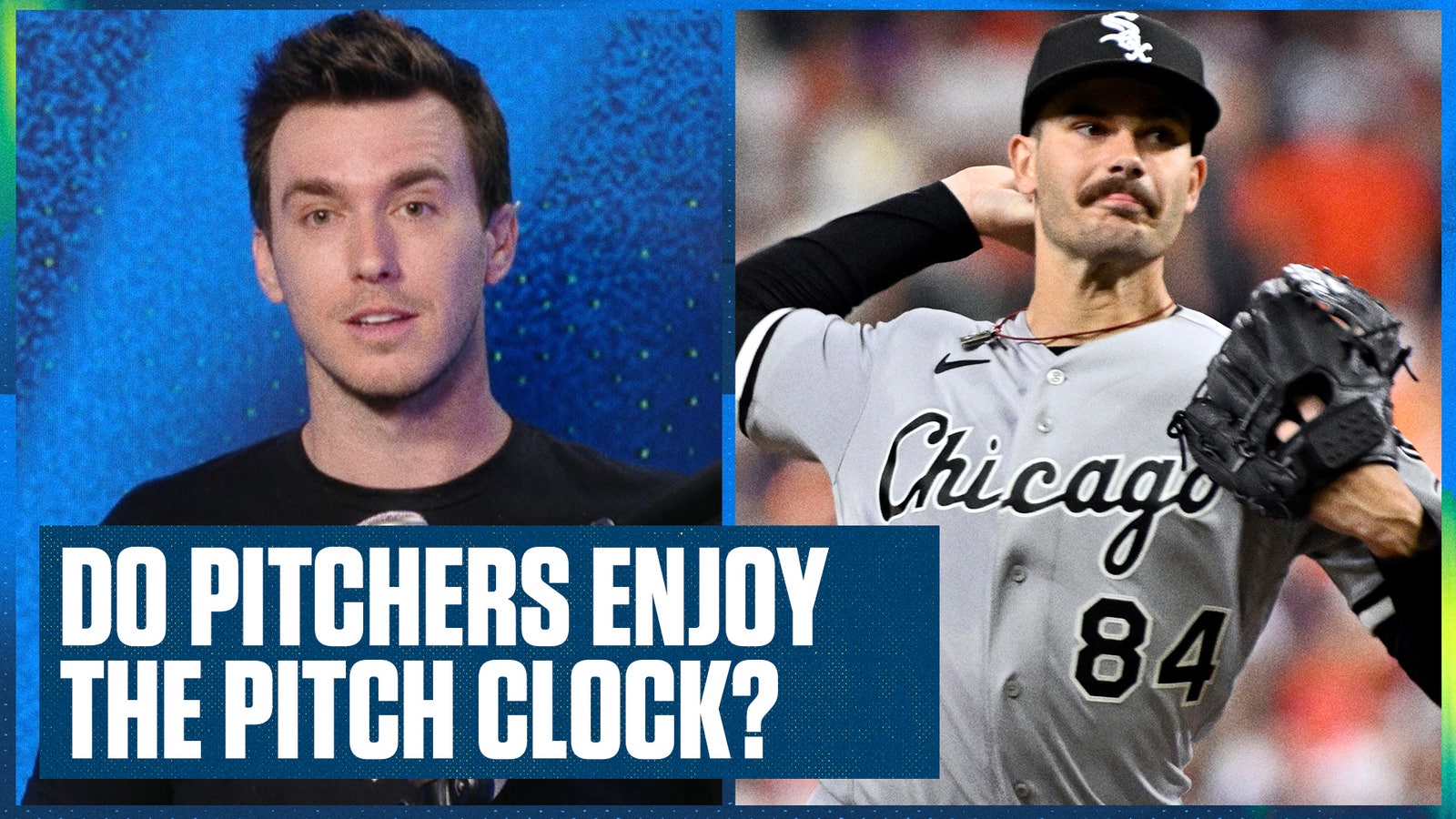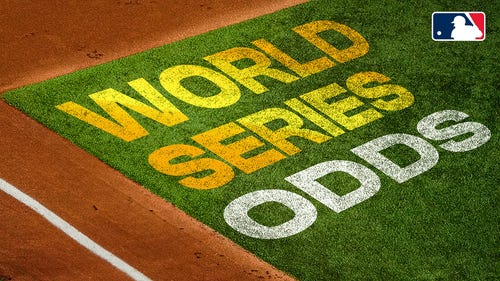
How do MLB players feel about a playoff pitch clock? We asked 9 All-Stars
On Feb. 25, Major League Baseball's pitch clock era began somewhat inauspiciously. It was the first day of Grapefruit League play, the time for players to get a feel for the new rules, and the Braves' opener ended in a tie on an automatic strike call.
Luckily, no similar instance has occurred since the regular season began. The effectiveness of the new rules is evident. Violation rates are declining, players are adjusting and nine-inning games are down to two hours and 38 minutes on average — 26 minutes quicker than a season ago and the fastest since 1984.
"I think we did manage to improve the game on the field without real downsides," commissioner Rob Manfred said while speaking to the Baseball Writers Association of America before the All-Star Game. "We're down to half a violation per game. Over 60% of our games are played with no clock violations at all. I think the number that has surprised me the most are pitches now are delivered with an average of six seconds left on the clock, so there is time out there still that is not being utilized."
One question looms, however. What will happen in October, when the stakes are highest?
MLB already demonstrated with its extra-inning automatic runner rule that not every change should continue into the postseason. Could the pitch clock fall into the same category? Or should there at least be an adjustment to the clock in the playoffs to provide players slightly more leeway?
Tony Clark, the executive director of the MLB Players Association, is advocating for the latter. Speaking at the same BBWAA meeting, Clark indicated that the union is pushing for "a few extra seconds" between pitches in the postseason for players to catch their breath.
Manfred, meanwhile, said he believes in general that the postseason should be played the same way as the regular season. He did, however, recognize there are exceptions and described himself as "open-minded" on the topic.
"Obviously, we don't want a postseason game decided based on a violation," Manfred said. "I understand it's a possibility. In terms of doing something in the postseason, making an alteration, we're going to continue to talk to the players."
So, what exactly do they think?
In talking to nine different All-Star players, the answers varied.
Texas' Nathan Eovaldi and Tampa Bay's Shane McClanahan both said they've grown to like the clock. Minnesota's Sonny Gray and Toronto's Jordan Romano have also gotten used to it but would like to see some slight adjustments come October for pitchers to regroup, similar to what Clark suggested.
Others are more adamantly against it.
"Do you want the game decided by a pitch clock violation?" Milwaukee closer Devin Williams asked rhetorically. "I mean, I have been against the idea of a pitch clock from the get-go. But they did what they did, you know? A bunch of people that never actually played are deciding what's best for us, which, that's up for debate. But, you know, it's definitely changed the game in the sense that, for me especially, I like to be completely locked in. That's when I'm at my best…now, every pitch I throw, I'm looking at the clock, ‘How much time do I have?'"
Williams has only committed two pitch violations this year, but the clock is constantly in his mind. It can break his focus. On more than one occasion this year, he has noticed the clock approaching zero and felt hurried to just "throw something."
One of those times came right before the All-Star break, when he closed out a game against Cincinnati with Joey Votto in the box. Williams rushed a fastball that was luckily executed well.
"Then, the very next pitch, I couldn't hear the Pitchcom, and I've got five seconds left," Williams explained. "So, the catcher's like, ‘Hurry up, throw this,' and I just hurry up, came set and threw a changeup. Luckily, I executed that again. But if I threw that right down the middle and he hits a home run there, I probably would be going off about this f—ing stupid clock because I've got 15 seconds to throw. That's not the game that I grew up playing."
Williams expressed that he doesn't mind that games are faster, but he doesn't want playoff games decided by a violation.
Atlanta's Spencer Strider falls in a similar camp.
"I don't like it," Strider said. "I'll always not like it, just because this was a game that was created with no time and different field sizes and, yeah, it was unique. I kind of hate that technology is sort of finding its way into it."
While Strider doesn't have a sense of whether the clock will remain in October, he believes that the next couple months of play will determine that fate.
"Hopefully, there are some very important divisional games and wild-card games that happen that sort of put that to the test and give us some idea of what we need to do in the postseason," Strider said. "I think there's definitely a benefit to the pace, but the last thing it needs to do is detract from the product on the field. So, if there's any fear that's going to happen, then there certainly needs to be an adjustment."
One adjustment, suggested by Gray, is simply giving pitchers an extra timeout or disengagement in the playoffs.
Gray understands MLB wanting to be strict about enforcing the pitch-clock rules and sticking with them, but he does miss the ability to step off and regroup when he gets behind 2-0.
"If you get into a bad train of thought, instead of having a little bit of time to yourself — ‘Let me go take a breath' — you've got to call the catcher out or the infielders out or something like that," Gray said. "That's cool, and yes, I am getting a breath, but all I needed was like five seconds on the back of the mound where I could just get off the dirt for a second and just [exhale] and then get back on the mound and be ready to go."
Romano appreciates what the clock has done for the speed of the game — he's a fan of the timer in the regular season — but echoed Clark's sentiments about the postseason.
"I just think it'd be a shame in October, you know, big spots, it's a pretty emotional game especially in the playoffs, it'd be really tough to see something decided by a violation," Romano said. "I'd love if they added a couple extra seconds, just so the game still moves along, but a couple extra seconds to think so we don't have any incidents."
He also wondered if some of the postseason's most memorable moments could lose some luster with the clock removing the tension.
"You don't want to speed something like that up," Romano said. "I don't really know how to combat that. I've heard thoughts of three at-bats a game, you can call off the clock. … I think that would be really cool, just in big spots, ‘Hey, clock stops, worry about the batter.'"
His concerns are shared by some hitters, too.
Baltimore outfielder Austin Hays appreciates the new pace of the game, but he is worried a pitch clock in October could impact the magic of those moments.
"So much weighs on every pitch, you'd almost want the game to last longer," Hays said. "You don't want the game to go quicker. You play the whole season to get to those moments. Me, personally, as a fan of the game of baseball, I would want the game to last longer in the postseason. I'd want those moments to be drawn out and be more dramatic."
Oakland's Brent Rooker, who spent most of last year in Triple-A, at this point can't remember what life was like without the pitch clock. But he understands why some players might want it gone in the playoffs, given how much hangs on each pitch. Cubs pitcher Justin Steele is also not particularly adamant about whether or not the timer should be kept in postseason play.
"I haven't put too much thought into it, but with the leverage of the games and the situations later in games, in the postseason I could see why players, fans, whoever, would want a little bit more time on the clock to make a few decisions," Steele said. "In games that matter that much, you never want to feel rushed. It's not basketball, like there's a shot clock, or anything like that. It's a little different. You want to think about what you're doing."
Others see little reason to adjust from the current setup.
"The fact that we've already been dealing with it now, why change anything?" Eovaldi said when asked about a pitch clock in the postseason.
He has seen the benefit the pitch clock provides in speeding up the game and getting players home to their families at a more normal hour. He was not always on board — "Spring training, having to deal with it was a pain in the butt" — but, with time, he no longer feels as rushed. Eovaldi would like to see leniency for pitchers returning to the mound after a ball is put in play, but overall he feels that umpires have demonstrated a good feel.
"I think it's part of the game where everybody's going to continue to get used to it, and it's going to be good for baseball," Eovaldi said.
Rowan Kavner covers the Dodgers and MLB as a whole for FOX Sports. He previously was the Dodgers’ editor of digital and print publications. Follow him on Twitter at @RowanKavner.
insert favorites here











